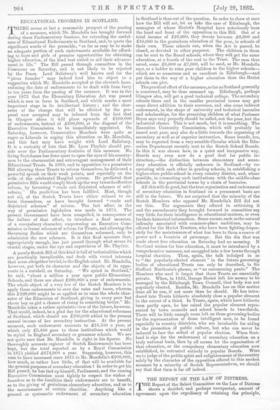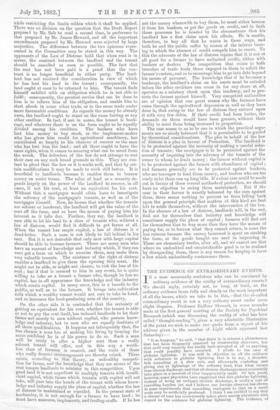THE REPORT ON THE LAW OF DISTRESS.
THE Report of the Select Committee on the Law of Distress shows a decided, and perhaps unexpected, amount of agreement upon the expediency of retaining tlx principle,
while restricting the limits within which it shall be applied. There was no division on the question that the Draft Report proposei by Mr. Salt be read a second time, in preference to that proposed by Mr. James Howard, and all the important amendments proposed by Mr. Howard were rejected by large majorities. The difference between the two opinions repre- sented in the Committee may be stated in this way. The opponents of the Law of Distress hold that when rent is in arrear, the contract between the landlord and the tenant should be annulled as soon as possible. The fact that the rent has not been paid is a proof that the con- tract is no longer beneficial to either party. The land- lord has not received the consideration in view of which he has lent his land to the tenant ; consequently, the land ought at once to be returned to him. The tenant finds himself saddled with an obligation which he is not able to fulfil; consequently, the greatest service that can be done to him is to relieve him of the obligation, and enable him to start afresh in some other trade, or in the same trade under more favourable conditions. As regards the money he already owes, the landlord ought to stand on the same footing as any other creditor. In fact, if not in name, the tenant is bank- rupt, and whatever there is on the farm ought to be equally divided among his creditors. The bankers who have lent him money to buy stock, or the implement-maker who has given him credit for agricultural machinery, has contributed as largely to his chances of success as the man who has lent him the land ; and all three ought to have the same rights, when it comes to securing what can be saved from the wreck. The defenders of the law do not attempt to rest their case on any such broad grounds as this. They are con- tent to plead that the law as it is works well, and that by cer- tain.modifications it may be made to work still better. It is beneficial to landlords, because it enables them to borrow money on easier terms. The value of land as a security de- pends largely on the power of the landlord to recover, in all cases, if not his rent, at least an equivalent for his rent. Without this, a mortgagee would often have to investigate the solvency of the mortgagor's tenants, as well as of the mortgagor himself. Now, he knows that whether the tenants are solvent or insolvent, the landlord will get the value of the rent off the farm, and so have the means of paying him his interest as it falls due. Further, they say, the landlord is now able to let his land to a class of tenants who, without a law of distress, would find it difficult to get farms at all. When the tenant has ample capital, a law of distress is a dead-letter. Such a man is not likely to fall behind in his rent. But it is not desirable that only men with large capital should be able to become farmers. There are many men who have an amount of knowledge and industry which, if they can once get a farm on which to exercise them, may make them very valuable tenants. The existence of the right of distress enables a landlord to give them the opening they want. He might not be able, or might not choose, to risk the loss of his rent ; but if that is secured to him in any event, he is quite willing to take as a tenant a farmer who, though he has no capital, has to all appearance the knowledge and the industry which create capital. In many cases, this is a benefit to the public, as well as to the farmer. It brings into cultivation soils which a wealthy tenant would not care to take in hand, and so increases the food-producing area of the country.
On the other side it is contended that the certainty of getting an equivalent for his rent, whether the tenant is able or not to pay the rent itself, has induced landlords to let their farms not merely to men 'without capital, who possess know- ledge and industry, but to men who are equally destitute of all three qualifications. It happens not infrequently that, the lees chance a man has of making his living by farming the more confident he is of his power to do so. Such a man will be ready to offer a higher rent than a really solvent tenant will offer, and in this way a worth- less class of farmers is created, and the rents of those who really deserve encouragement are thereby raised. There exists, according to this theory, an unhealthy competi- tion for farms, and the knowledge that they are secure of the rent tempts landlords to minister to this competition. Upon good land it is not expedient to multiply tenants with insuffi- cient capital, while farms which tenants with capital will not take, will pass into the hands of the tenant with whom know- ledge and industry supply the place of capital, whether the law of distress be maintained or repealed. In the present state of husbandry, it is not enough for a farmer to have land ; he must have manures, implements, and feeding-stuffs. If he has not the money wherewith to buy them, he must either borrow it from his bankers, or get the goods on credit, and in both these processes be is headed by the circumstance that his landlord has a first claim upon his effects. He is unable, therefore, to buy all that he wants in these ways, and both he and the public suffer by reason of the inferior farm- ing to which the absence of credit compels him to resort, To this the advocate of the law of distress rejoins that it is not at all good for a farmer to have unlimited credit, either with bankers or dealers. The competition that exists in both branches of trade leads those engaged in them to solicit the farmer's custom, and so to encourage him to go into debt beyond his means of payment. The knowledge that if he becomes a bankrupt, the landlord's claim on his assets must be satisfied before the other creditors can come in for any share at all, operates as a salutary check upon this tendency, and so pro- tects the farmer against himself. Very competent authorities are of opinion that one great reason why the farmers have come through the agricultural depression as well as they have done is, that owing to the law of distress they entered upon it with very few debts. If their credit had been better, the demands on them would have been greater, without their ability to meet them being increased in proportion. The case seems to us to be one in which the practical argu- ments are so nicely balanced that it is permissible to be guided by theoretical considerations. The plea in behalf of the law of distress is a plea in favour of Protection. The landlord is to be protected against the necessity of making a careful selec- tion of tenants ; the mortgagee is to be protected against the necessity of inquiring into the solvency of the tenants of the owner to whom he lends money ; the farmer without capital is to be protected against the farmer with abundance of capital ; and farmers generally are to be protected against bankers, who are too eager to lend them money, and traders who are too ready tolet them run up long bills. If a clear case could be made out in favour of these several methods of protection, we should have no objection to seeing them maintained. But if the case in their favour is exactly balanced by the case against them, there seems nothing to prevent us from falling back upon the general principle that matters of this kind are best left to settle themselves, without the intervention of the law. In the absence of a law of distress, landlords will, in the end, find out for themselves that industry and knowledge will sometimes supply the place of capital ; farmers will find out for themselves that to buy more than they have the means of paying for, or to borrow what they cannot return, is none the less ruinous because the money borrowed is spent on stocking the farm, or the goods bought are used in improving it. These are elementary truths, after all, and we cannot see that where no undoubted and unmistakeable good is to be realised by disregarding them, there is any reason for keeping in force a law which undoubtedly contravenes them.



































 Previous page
Previous page